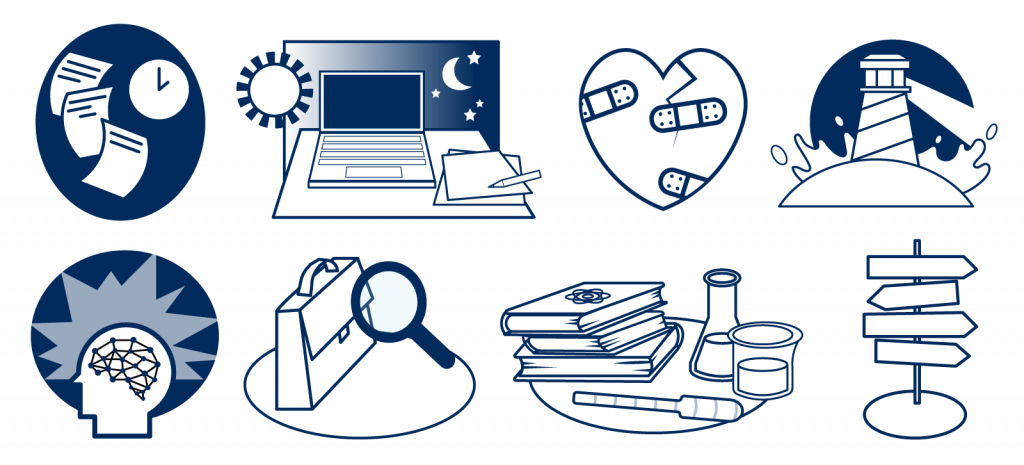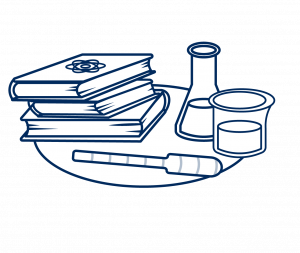Life is filled with adversities. Without warning, it can place us in front of an obstacle we’d never imagine ourselves to be in. Yet somehow, we find a way to come out the other end no matter the year, month or hour. At the Innovation Hub, we take pride in our diverse team of students who co-create and represent our vibrant UofT community. But behind each of these students are the adversities they’ve faced that has helped shape them to become the person they are today. We decided to ask our team this question: What’s your greatest comeback story?
In this post, we’ll be sharing personal anecdotes with topics ranging from mental health, stress management and the trial-and-error process, which you may relate to as a student or in your day-to-day life. Hopefully, for you as the reader, these stories can be proof that there is no singular path to success.
Each of the stories below shares how a Comeback story resonates with everyone differently. To read a story, click or select the numbered titles below, and the story will expand for you to read!
1. Making the Most from A Mistake The entire month after that until I met with the dean, had been filled with extreme anxiety, not knowing the consequences of what took place. I wouldn’t even know how to explain to my parents that I might not graduate because of this. I was too embarrassed to share my situation with anyone, so only my best friend was available to support me. I was literally crying almost every night out of frustration and stress. It was especially hard during Christmas when I visited family and they all would tell me how excited they are for me to graduate. After a few weeks had passed, I eventually started to open up to a few of my other friends and started to reach out to folks on campus that could help. I reached out to my registrar and my accessibility services councillor. I even joined a weekly ADHD learning strategy group, to see if there’s anywhere I can improve. The uncertainty was killing me, and there wasn’t enough research I could find online that could provide me comfort. It was through the support of my friends and my desire and will to find answers that ultimately pulled me out of that hole. It helped me realize that I need to recognize my burnout. Learning how to put my health and wellbeing before schoolwork is something that I really started to pay attention to after that situation. I also learned that it’s not weak to reach out and ask for help.
“Undergrad was a long, 5-year experience for me. When I think about resilience, I immediately think of my final year…”
2. Surviving Sleepless Nights While I believe that the normalization of long, sleepless nights needs to change, the experience gave me many of the tools I use today. It reshaped the way I thought about the spaces we live in and what it means that a handful of people can dictate what our world looks like. It showed me that without social awareness and asking people what they want, design can be harmful rather than beneficial. And most importantly, it showed me how NOT to deal with school and work stress and how to set boundaries and practice self-care.
“Long nights at the studio are a regular thing. It was no different for me during my undergrad…”
3. Progress is a Slow Process For me, the stress started manifesting itself in final exams. I would complete my test and notice I’d literally pulled out my hair without realizing it. In 2nd year, when my anxieties around school continued to build unchecked, I began to pull out my hair all the time-during lecture, assignments, eating dinner, reading a book, and even watching TV. Of course, what began as a pesky problem now began to dominate many aspects of my life; this no longer was a school-stress isolated issue. My partner and friends began to notice. I tried to stop multiple times. I became embarrassed of my appearance and dreaded going home to see my family. For me, there was no turning point, no immediate solution for this. All progress I made was gradual. To start, I reached out to Health and Wellness services and registered for counselling. I learned that wearing band-aids on my fingers sometimes helps! On days when I feel most self-conscious, I can wear a bandana. Thankfully, I found that most friends really don’t care what your hair looks like – many of them sticking around this long gives me hope. Two years later, I still struggle with this issue every day, but… the comeback is knowing I’m not alone.
“Most of us in my program (and students in general) deal with considerable stress on a daily basis…”
4. Creating a New Narrative But after working with youth and community arts programs for 7 years, with a tremendous amount of support from my partner, I realized that I was always supposed to do my best to help other people. It didn’t require a monumental shift of everything I held dear. All I needed was to reframe what I was capable of and what I enjoyed doing. In 2017, I re-enrolled into a new program, and graduated with Honours—including completing a thesis project supervised by a professor I had in my first stint at my previous University, and whose class I failed after only attending once—after what was essentially a 10-year undergrad. This fall, I started a master’s Program at the University of Toronto, and I celebrated my 5-year anniversary with the biggest support and motivation in my life. So things worked out alright.
“In 2012, I was enrolled in another University doing an undergraduate degree I didn’t enjoy. I consistently missed classes and assignments…”
5. Accepting Anxiety I experienced my first ever anxiety attack last January. I had no clue what was happening, and to be honest, didn’t care to address it when it first happened. I was pre-occupied with my day-to-day tasks at hand. But then it started to happen more frequently. My mental battles soon became physical ones, and I couldn’t hide away from it. After opening up to people around me, I soon found out what I was experiencing was anxiety. I thought to myself, “Is this what it really feels like?” Shortness of breath, heart palpitations, and constant fear. When will this stop? Soon one week turned to a month, and a month turned to six months, and nothing had changed. When the lockdown started, I thought, “Hmm, now I have time to focus on myself and my health.” But in reality, I ended up spending more time alone with my thoughts, which made it even worse. Now you may be wondering, “did you overcome it?” Short answer is no. Long answer is it’s okay if I can’t! The pressure I put on myself to overcome it was more crippling than the anxiety itself, that soon enough I had no choice but to accept it. I’ve never felt a greater sense of relief once I did. I quickly learned how accepting a difficult situation, than shying away from it is the first sign of progress. And I’m glad I did.
“I experienced my first ever anxiety attack last January. I had no clue what was happening, and to be honest, didn’t care to address it when it first happened…”
6. Pivoting Plans During a Pandemic Ever since I knew that I was coming to U of T, I had the next 5 years of my life mapped out. I would start university, do a co-op (co-operative education program) after my third year and go straight into the industry after I graduated, perhaps even at the same company I did my co-op at. I thought it was all set-in stone for me. But then the world turned upside down with the start of COVID-19. I thought I could escape the consequences. I had a position, but every day I heard stories of more and more people losing their jobs, including co-op students. Eventually, I became one of those students. I was lost. What was I supposed to do? Go back to school, unprepared, with no idea what courses I wanted to take and what path I wanted to follow? It was one of the most terrifying things I’d ever been through, not knowing what my future looked like. But I came back from it. I chose to go to school. I did the research I needed, picked the courses I needed and jumped right back into it all when classes started in September. I secured a work-study position to get more experience and took extra courses to see what I wanted to do in the future. I took action and I adapted, because that’s what we have to do when we’re kicked down. It’s hard, and it’s scary, but it is possible, and in the end, it can only make you stronger.
“I am a planner. Always have been and always will be. I find it comforting, and reassuring. Having those plans gives me the chance to feel…”
7. Conquering a Challenging Course But the week that followed when I got back was an onslaught of midterms. I was jetlagged and tired, so studying was hard. The last midterm was this difficult course I had been taking. My heart sunk when I had to hand it in—I left so many questions blank! (caveat: I wasn’t the only student who did badly; it was an all-around exam fail and professor had to curve it heavily so that the class passed. Even so, I did poorly—extra shame!) Feeling dreadful, I called my parents to tell them. I cried a lot, was regretting the trip, and asking if I should drop the course. My mother was surprisingly nonchalant. She asked: in 20 years, are you going to remember that course or this wonderful trip? She told me to just finish the course and show myself it didn’t matter as much. I ended up not dropping the course and pulling up my grades by lots of extra studying. In the end, my mom was sort of right: I do remember my trip, but I also remember the failure and her wisdom about it just as much.
“During my second-year undergrad studies, I took one of the most challenging courses during my second semester…”
8. Finding Redirection from Depression The next term, I failed again. I actually received a grade of 27% in a class, which is incredibly embarrassing. I didn’t think I would live beyond that year. I needed to stop treading water or else I would drown. The first change was my major – I switched into Philosophy, where I remembered the joy of learning surrounded by nurturing and inspirational professors. I then changed my coping mechanisms – I learned how to tackle problems head on, make clear boundaries, and value myself. Lastly, I was extremely lucky to have amazing friends and the most incredible partner who loved me when I couldn’t love myself, reminded me why life was worth living, and pushed me on to greater goals. I graduated in 2019 with an award from my department for best undergraduate paper. Today, I am in my Master’s (even with those awful grades!) and am pursuing a career I am passionate about. Most of all, I am living my life for me – I am happy and safe.
“When I started my undergrad, my biggest question was, “What’s the point?”. I had been diagnosed with depression in high school…”
Each student handled their moment of adversity differently, however what they all shared in common was their ability to withstand it. This is what we’d like to call resilience. Since the pandemic, resilience has been a source of personal strength for many during this challenging period of their lives. Stories of resilience often remain personal, saved for our closest of friends and family members. What if we changed that narrative? It’s time we encourage storytelling to inspire and remind one another just how resilient we are during moments of adversity. We hope we inspired you to reflect on your own adversities and perhaps, you can share your comeback story with us too!
Have a comeback story you would like to share? The Innovation Hub welcomes you to submit your own responses to innovationhub@utoronto.ca. Like the stories above, your responses will be anonymously featured in a follow-up post.










0 comments on “What’s Your Greatest Comeback Story?”